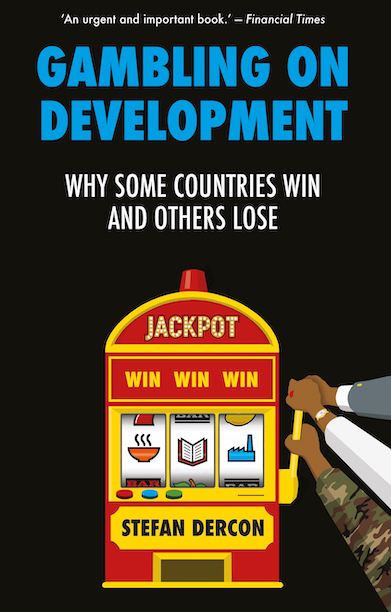
GAMBLING ON DEVELOPMENT
Why Some Countries Win and Others Lose
We spend a lot of money on aid – although not as much as we used to. Does it work or is it, as some claim, a waste? And behind that, why do some countries develop and others not? Reading Our Times podcast host and journalist Nick Spencer talks to Stefan Dercon about his book Gambling on Development.

Genre:
Economy & Politics
Author:
Stefan Dercon
Publisher:
Hurst
Language:
English
AUTHOR BIO:
Stefan Dercon is Professor of Economic Policy and Director of the Centre for the Study of African Economies at the University of Oxford. Combining an academic career with long experience in international development policy, he is a former DFID chief economist and policy advisor to the UK foreign secretary.
Pages:
360
Publication:
2022
Rights available:
French, German, Italian, Portuguese, Russian
Rights Sold: Spanish
DESCRIPTION:
In the last thirty years, the developing world has undergone tremendous changes. Overall, poverty has fallen, people live longer and healthier lives, and economies have been transformed. And yet many countries have simply missed the boat. Why have some countries prospered, while others have failed?
Stefan Dercon argues that the answer lies not in a specific set of policies, but rather in a key ‘development bargain’, whereby a country’s elites shift from protecting their own positions to gambling on a growth-based future. Despite the imperfections of such bargains, China is among the most striking recent success stories, along with Indonesia and more unlikely places, such as Bangladesh, Ghana and Ethiopia. Gambling on Development is about these winning efforts, in contrast to countries stuck in elite bargains leading nowhere.
Building on three decades’ experience across forty-odd countries, Dercon winds his narrative through Ebola in Sierra Leone, scandals in Malawi, beer factories in the DRC, mobile phone licences in Mozambique, and relief programmes behind enemy lines in South Sudan. Weaving together conversations with prime ministers, civil servants and ordinary people, this is a probing look at how development has been achieved across the world, and how to assist such successes.
REVIEWS:
‘[An] urgent and important book.’ — Financial Times ‘A brilliant, well written and important book. Thoroughly recommended.’ — LSE Review of Books ‘Dercon uses his decades of experience as a well-travelled academician and policy advisor to the British government to provide an experiential look at the widely discussed question of why some countries grow while others lag behind.’ — Choice Reviews ‘Dercon’s skilful review of the past 20 years’ most important books is a useful primer for anyone unfamiliar with development studies. His elaborations draw on all of them. He is a development scholar who clearly deserves attention.’ — Development and Cooperation ‘This book, written by one of the greatest living development economists, is full of hard-won insights and provocative observation...
MEDIA: